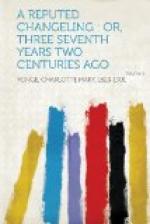The last sight they had of the tall dignified figure of the old lady was under the arch of the cathedral, where she was going to pray for their safety. Suzanne was to ride on a pillion behind the Swiss valet of Mr. Fellowes, whom Naomi had taken into her confidence, and the two young ladies each mounted a stout pony. Mr. Fellowes had made friends with the Abbe Leblanc, who was of the old Gallican type, by no means virulently set against Anglicanism, and also a highly cultivated man, so that they had many subjects in common, besides the question of English Catholicity. The two young cousins, Ribaumont and D’Aubepine, were chiefly engaged in looking out for sport, setting their horses to race with one another, and the like, in which Charles Archfield sometimes took a share, but he usually rode with the two young ladies, and talked to them very pleasantly of his travels in Italy, the pictures and antiquities which had made into an interesting reality the studies that he had hated when a boy, also the condition of the country he had seen with a mind which seemed to have opened and enlarged with a sudden start beyond the interests of the next fox-hunt or game at bowls. All were, as he had predicted, greatly shocked at the aspect of the country through which they passed: the meagre crops ripening for harvest, the hay-carts, sometimes drawn by an equally lean cow and woman, the haggard women bearing heavy burthens, and the ragged, barefooted children leading a wretched cow or goat to browse by the wayside, the gaunt men toiling at road-mending with their poor starved horses, or at their seigneur’s work, alike unpaid, even when drawn off from their own harvests. And in the villages the only sound buildings were the church and presbytere by its side, the dwellings being miserable hovels, almost sunk into the earth, an old crone or two, marvels of skinniness, spinning at the door, or younger women making lace, and nearly naked children rushing out to beg. Sometimes the pepper-box turrets of a chateau could be seen among distant woods, or the walls of a cloister, with a taper spire in the midst, among greener fields; and the towns were approached through long handsome avenues, and their narrow streets had a greater look of prosperity, while their inns, being on the way to the place of warfare, were almost luxurious, with a choice of dainty meats and good wines. Everywhere else was misery, and Naomi said it was the vain endeavour to reform the source of these grievances that had forced her father to become an exile from his native country, and that he had much apprehended that the same blight might gradually be brought over his adopted land, on which Charles stood up for the constitution, and for the resolute character of Englishmen, and Anne, as in duty bound, for the good intentions of her godfather. Thus they argued, and Anne not only felt herself restored to the company of rational beings, but greatly admired Charles’s sentiments and the ability with which he put them forward, and now and then the thought struck her, and with a little twinge of pain of which she was ashamed, would Naomi Darpent be the healer of the wound nearly a year old, and find in him consolation for the hero of her girlhood? Somehow there would be a sense of disappointment in them both if so it were.




